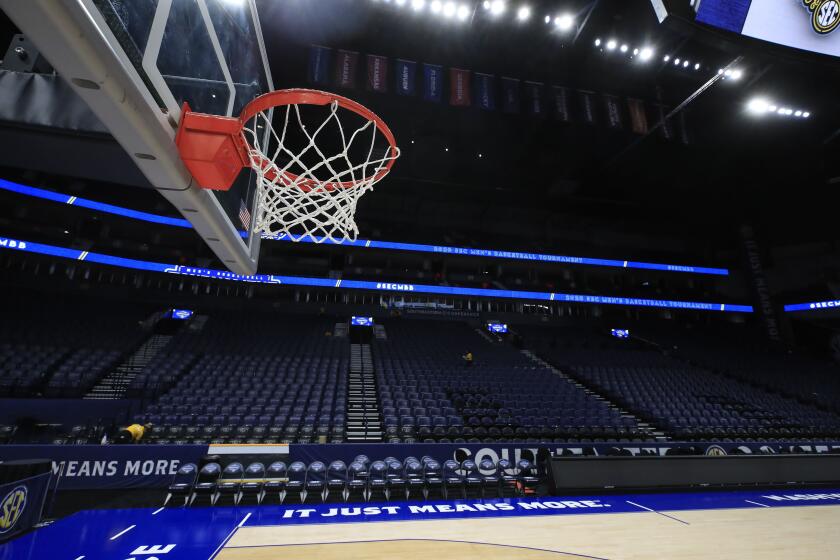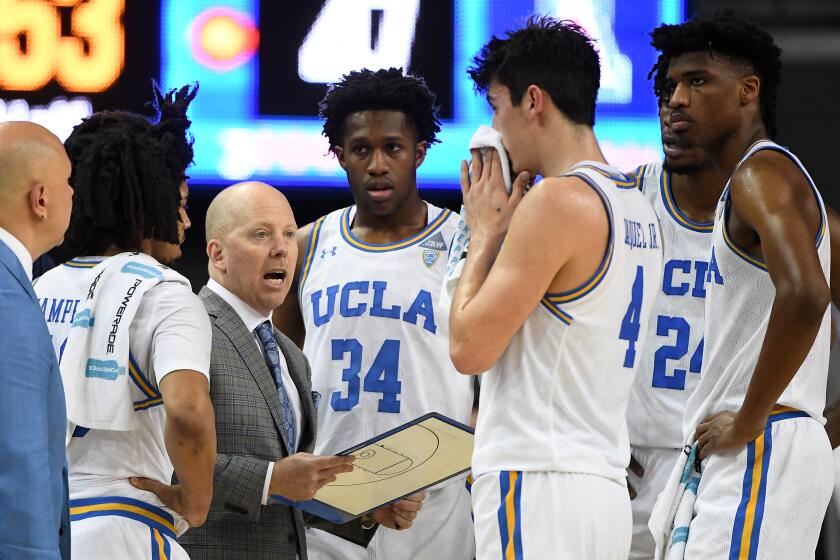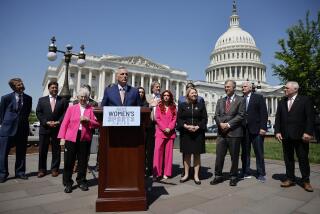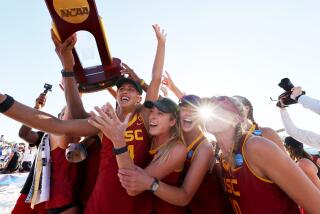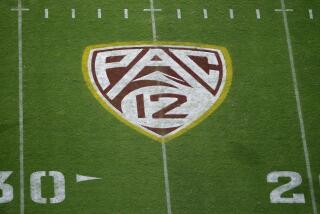NCAA, Pac-12 were slow to do the right thing in canceling tournaments
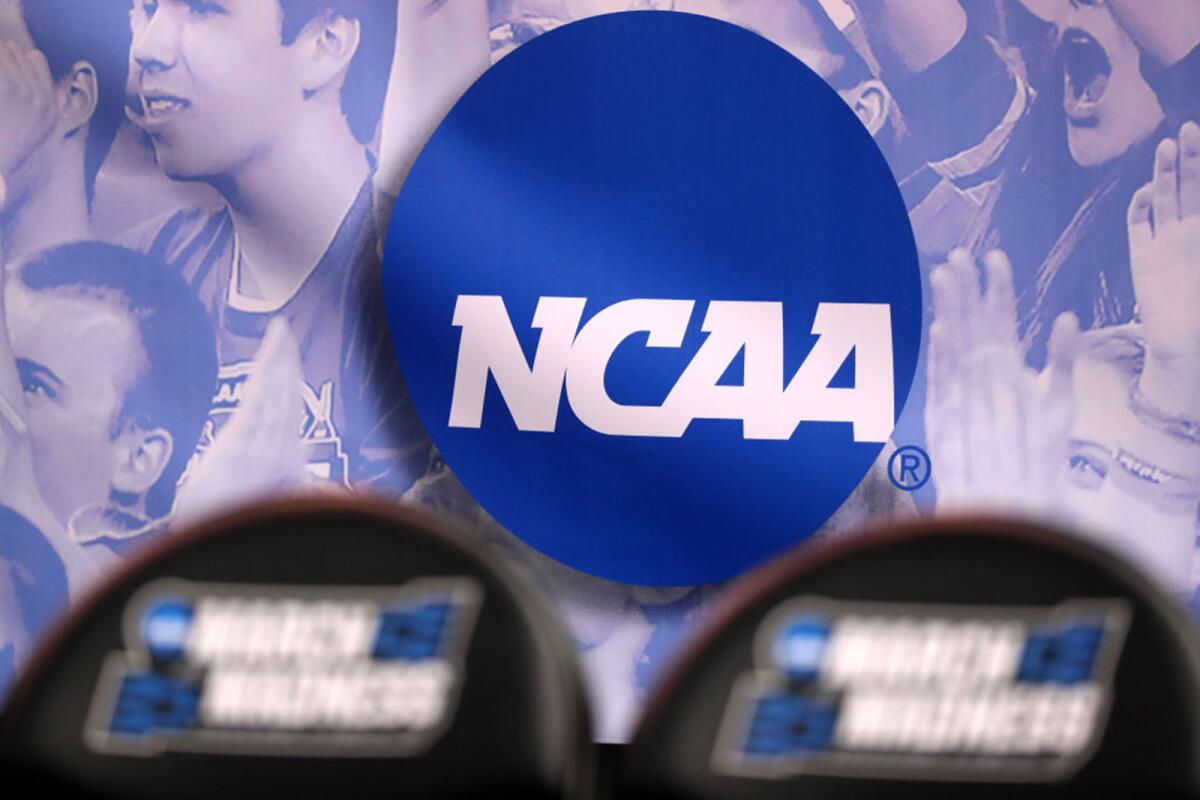
- Share via
LAS VEGAS — An organization’s stated mission isn’t necessarily its actual purpose. Capitalism might as well be this country’s official religion. These were the lessons of the week.
So, there was some teaching taking place here, even if it was unintentional. The student-athletes who gathered in this city over the last couple of days observed how their world really functions.
Of course, this shouldn’t be the instruction universities offer the leaders of tomorrow, not unless the schools intend on molding them into the kinds of reactionaries who run the bodies that govern collegiate athletics.
There was nothing admirable in how Pac-12 commissioner Larry Scott reached the point of canceling his conference’s basketball tournament on Thursday morning. Nor was there anything honorable in the way NCAA president Mark Emmert scrapped March Madness later in the day.
Though the coronavirus outbreak required quick action, Scott and Emmert operated at a sloth-like pace. When the student-athletes they governed needed their leadership, they instead revealed their misplaced priorities.
For the first time in its 81 year history, the NCAA basketball tournament was canceled as the sports world continues efforts to control the coronavirus.
The Pac-12 didn’t make its decision until the morning after four games were played in front of live audiences at T-Mobile Arena. The NCAA delayed its decision until a day after it announced plans to stage the national basketball tournament in empty arenas.
Don’t be misled by the intermediate steps that were taken. The cancellations were always inevitable.
If the Pac-12 and NCAA were what they claimed to be, if the well-being of their student-athletes was their top priority, they should have been the first organizations to bar fans or cancel games. Many of their member universities had already canceled in-person instruction. If studying with others was considered dangerous, how could it not be to compete in a physical sport in packed arenas?
The truth is that it was. It always was.
The decisions the Pac-12 and NCAA faced were no-brainers. But they were a step behind professional sports leagues in acting, requiring more time than necessary to make obvious choices.
In the case of the Pac-12, at the very least it never should have allowed fans into T-Mobile Arena. The conference exposed their players to fans who traveled from at least six states.
When explaining why the conference tournament was canceled, one of the factors the Pac-12 mentioned was the safety of “all those who attend” its events. But it was too late. If only for a day, the Pac-12 allowed separate fan bases to share rows and sections of the stands. These fans will now head home, many by plane, possibly spreading anything they might have caught while cheering on their teams.
Not to mention the fans spent time and money traveling to a tournament they never had a chance of seeing to the end.
The fact the Pac-12 and NCAA waited to see what professional sports leagues would do was extremely telling.
This wasn’t as much about the people in charges as much as it was about what organizations such as the Pac-12 and the NCAA have become: money-making machines beholden to commercial interests.
By Wednesday, Scott and Emmert had to know what they had to do.
But the widespread economic ramifications made them reluctant to cancel their signature basketball tournaments. And this is where they failed as leaders. Then again, they hold their respective positions specifically because they have judgment-clouding allegiances to their bottom lines.
The NCAA is a nonprofit organization that operates like a for-profit company. It doesn’t want Gandhi as its leader.
The Pac-12 men’s basketball tournament, and all other conference sporting events, have been canceled amid the growing coronavirus outbreak.
What was particularly frightening about this was how Scott and Emmert held off canceling their tournaments until Rudy Gobert of the Utah Jazz tested positive for coronavirus and prompted the NBA to suspend its season. If Gobert’s illness wouldn’t have been discovered, the Pac-12 and NCAA very well could have continued hosting basketball games until one of their own players was infected.
As UCLA athletic director Dan Guerrero departed T-Mobile Arena after a meeting with Scott and the athletic directors of Pac-12 schools, he said there was “no question” calling off the conference tournament was the right decision. He wasn’t alone. If there’s a dissenting voice, it hasn’t been heard yet.
The unanimity further underscores the point that the choice was crystal clear.
As is the case with individual people, the strengths of institutions are often also the sources of their weaknesses. In many aspects, collegiate athletics have been enhanced by its profitability. There are more opportunities for athletes, more exposure, even better medical care. But in times like this, these same economics forces can be a ball and chain that make its governing bodies slow to respond, sometimes dangerously so.
More to Read
Go beyond the scoreboard
Get the latest on L.A.'s teams in the daily Sports Report newsletter.
You may occasionally receive promotional content from the Los Angeles Times.

